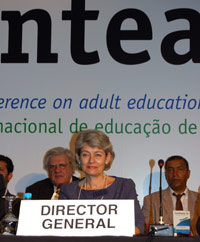Adult Education conference seeks to make lifelong learning a reality for all
Belem, Brazil, 1 December

- © UNESCO/Björn Otte
- Irina Bokova, Director General of UNESCO, at the opening session of the Sixth International Conference on Adult Education in Belem, Brazil.
“Today, we are here to demonstrate the power of adult learning and education to ensure a viable future for all. Our goal over the next four days is to take forward the agenda of adult learning and education by securing stronger political recognition of its critical importance for development and agreeing on concrete recommendations to increase its scope and reach,” said the Director-General of UNESCO, Irina Bokova, at the opening session of the Sixth International Conference on Adult Education in Belem, Brazil on 1 December
The conference is attended by 1500 participants, including representatives from over 156 Member States of UNESCO, along with other partners from the United Nations, bilateral and multilateral organizations, civil society and the private sector, as well as adult learners from all over the world. It seeks to highlight the central role played by adult learning and education in international education and development programmes, especially those concerned with sustainable development.
On the first day of the Conference, delegates heard addresses by Fernando Haddad, Brazil’s Minister of Education, Irina Bokova, Director-General of UNESCO, Alpha Oumar Konaré, former President of Mali and Founder of the Foundation Mouvement pour les États-Unis d’Afrique (Movement for a United States of Africa), Princess Laurentien of the Netherlands, UNESCO’s Special Envoy on Literacy for Development, Walter Hirche, President of the German UNESCO Commission and Ana Júlia Capera, Governor of Pará.
Brazil’s Minister of Education, Fernando Haddad, who was elected President of the CONFINTEA VI Conference in honour of the Host Country, underscored an urgent need for the provision of good quality education, especially in the current climate of economic crisis. He said: “Sustainable economic development depends on sustainable human development,” adding that the two issues needed to be discussed together.
Mali’s former President, Alpha Oumar Konaré, called for new approaches to funding education and gave a plea for a regional education strategy for Africa saying that “illiteracy can only be resolved in the context of endogenous development”. Mr. Konaré was critical of official development agencies saying that “institutions needed to engage in self-criticism and carry out a thorough assessment of past mistakes.”
Princess Laurentien addressed the question of ‘How to achieve real progress?’ She said that in order to increase the impact of adult education, literacy, which goes to the heart of all issues, should be made everyone’s priority: “It is more urgent than ever before that literacy for children, young people and adults is moved up the list of national priorities. […] By making learning and literacy everyone’s business, we will increase our chance of multiplying our impact.”
Presented on the first day of the Conference were the Global Report on Adult Learning and Education (GRALE), which is based on a systematic analysis of 154 national reports, along with Regional Outcome documents.
GRALE shows that countries in all regions have put in place adult learning strategies and legislation. They have run literacy campaigns, forged new partnerships and made innovative use of information communication technologies. The Report also documents the variety and unevenness in recent developments in policy, governance and provision in adult education. It shows that not many countries have specific policies in adult education, and the present funding level for adult education is way below the resources needed to allow the sector to deliver its potential. It shows that adult learning is chronically underfunded and tends to suffer from poor coordination among the various partners involved. Low rates of participation and inequitable access remain key challenges.
The opening day of the conference also saw two plenary sessions – “Living and Learning for a Viable Future: The Power of Adult Learning” and “Inclusion and Participation in Adult Education.”
The conference will continue through December 4th.
- Author(s):UNESCOPRESS
- Source:UNESCO Press Release No. 2009-143
- 02-12-2009

